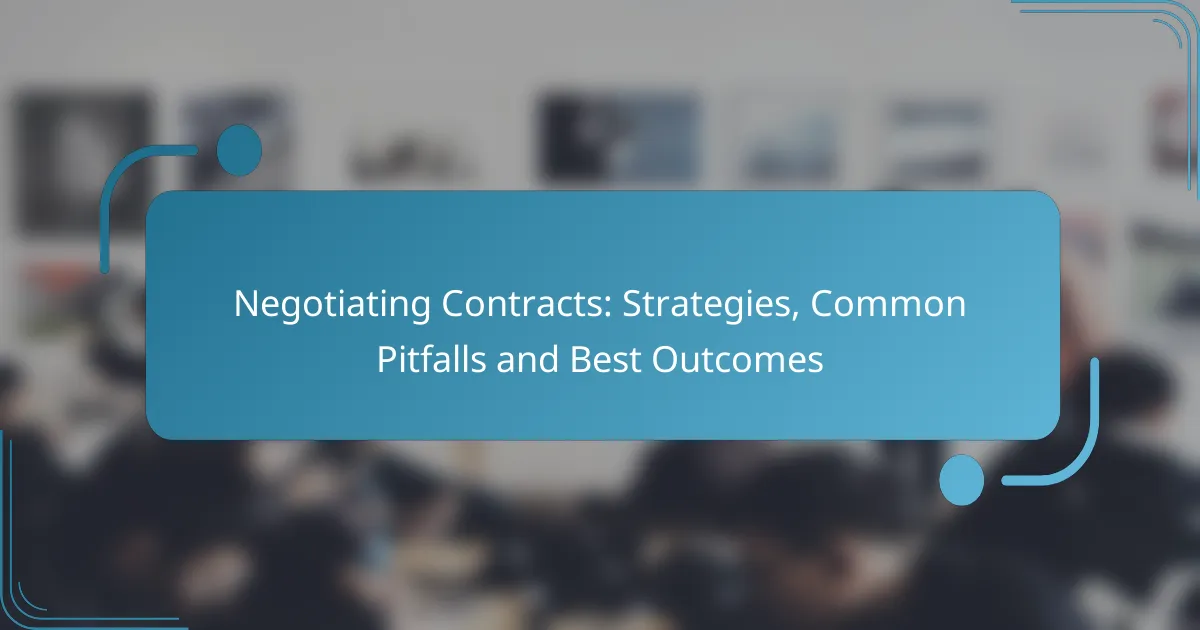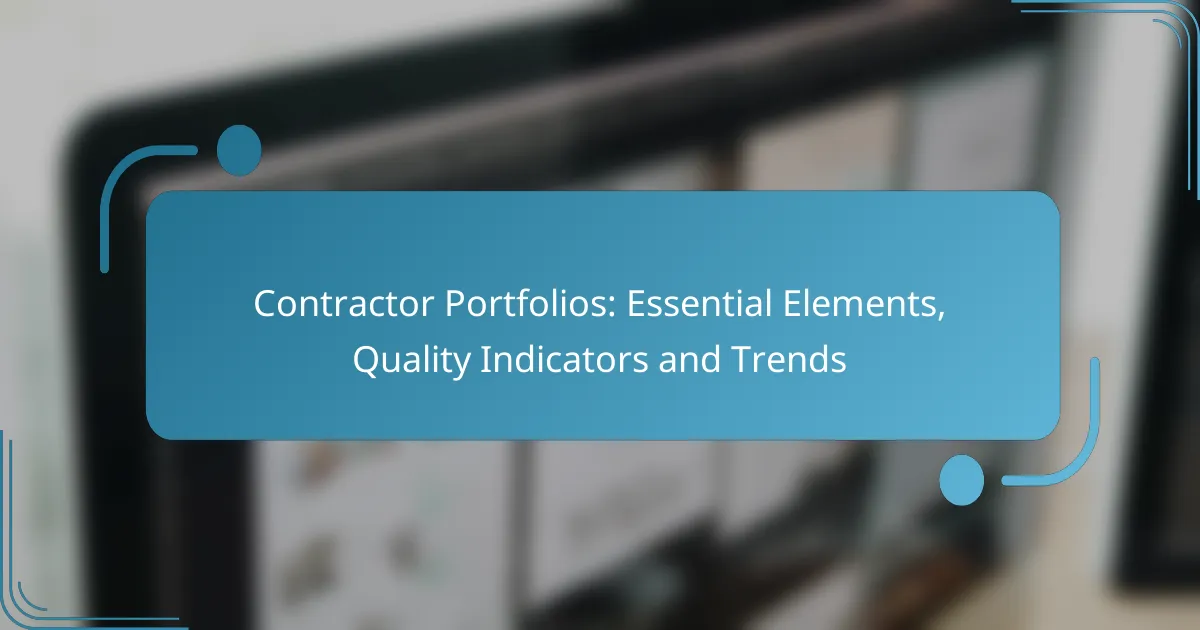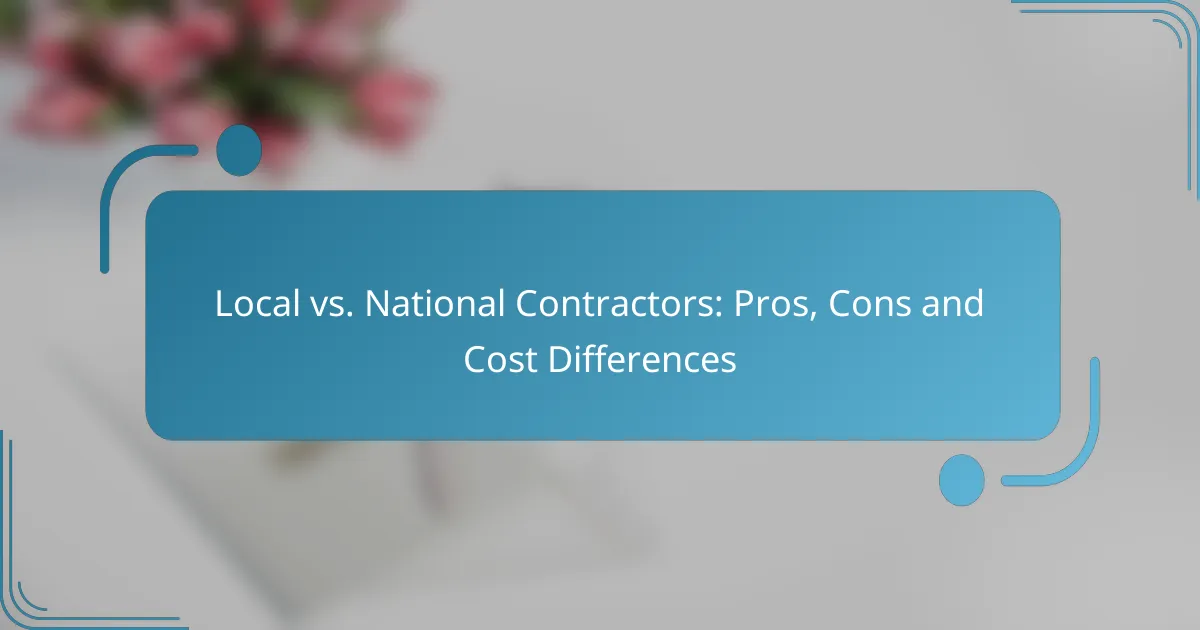Negotiating contracts effectively requires a blend of preparation, communication, and an understanding of all parties’ interests. By avoiding common pitfalls such as unclear terms and neglecting legal aspects, negotiators can enhance their chances of achieving favorable outcomes. Establishing clear objectives and remaining flexible throughout the process are essential strategies for successful negotiations.
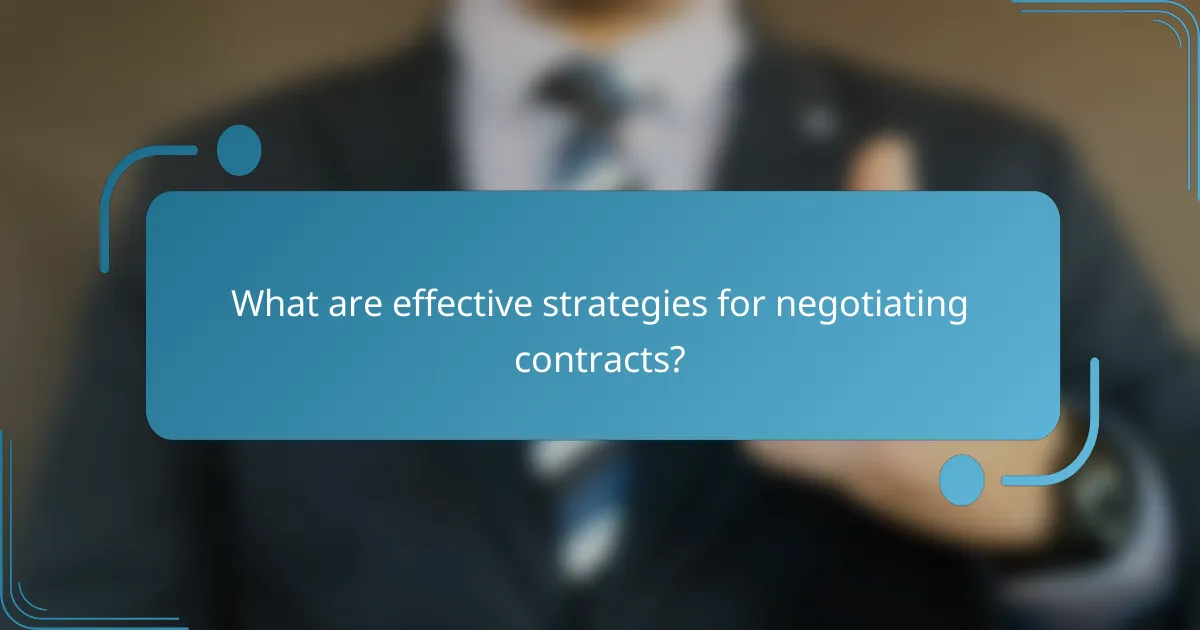
What are effective strategies for negotiating contracts?
Effective strategies for negotiating contracts include thorough preparation, clear communication, and understanding the interests of all parties involved. By employing these techniques, negotiators can achieve favorable outcomes while minimizing misunderstandings and conflicts.
Preparation and research
Preparation is crucial in contract negotiations. Research the other party’s background, interests, and previous contracts to understand their position better. This knowledge allows you to anticipate their needs and tailor your proposals accordingly.
Additionally, familiarize yourself with market standards and benchmarks relevant to the contract. Knowing typical terms, pricing, and conditions can strengthen your negotiating position and help you identify unreasonable demands.
Clear communication
Clear communication is essential for successful negotiations. Articulate your needs and expectations directly while being open to feedback. Avoid jargon and ensure that all parties understand the terms being discussed.
Regular check-ins during the negotiation process can clarify misunderstandings and keep discussions on track. Summarizing key points throughout the conversation can also help reinforce mutual understanding.
Understanding interests
Understanding the underlying interests of both parties can lead to more effective negotiations. Instead of focusing solely on positions, explore the motivations behind each party’s requests. This approach can reveal opportunities for compromise and creative solutions.
Ask open-ended questions to uncover what each party truly values. For example, if a party insists on a specific term, inquire about their reasons to find common ground that satisfies both sides.
Leveraging alternatives
Having alternatives, or a “BATNA” (Best Alternative to a Negotiated Agreement), gives you leverage in negotiations. Knowing your options allows you to negotiate from a position of strength and can prevent you from accepting unfavorable terms.
Evaluate potential alternatives before entering negotiations. This preparation can help you remain confident and assertive, as you are aware of what you can pursue if an agreement cannot be reached.
Building rapport
Building rapport with the other party can create a more collaborative negotiation atmosphere. Establishing a positive relationship fosters trust and encourages open dialogue, making it easier to address concerns and find mutually beneficial solutions.
Engage in small talk or express genuine interest in the other party’s perspective. This approach can break down barriers and lead to a more productive negotiation process, ultimately resulting in better outcomes for both sides.
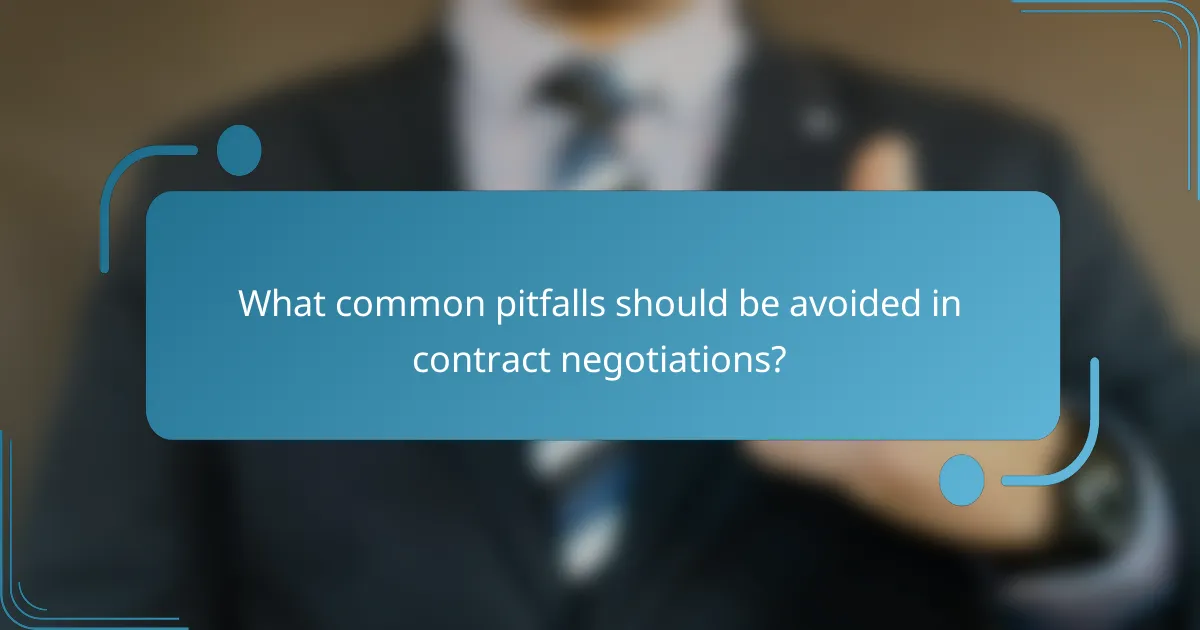
What common pitfalls should be avoided in contract negotiations?
Avoiding common pitfalls in contract negotiations is crucial for achieving favorable outcomes. Key issues include unclear terms, neglecting legal aspects, ignoring cultural nuances, and failing to document agreements properly.
Lack of clarity in terms
Ambiguous language in contracts can lead to misunderstandings and disputes. Ensure that all terms are clearly defined and unambiguous to avoid potential conflicts. For instance, instead of using vague terms like “reasonable time,” specify exact deadlines.
Consider using bullet points or numbered lists to outline key responsibilities and deliverables. This format enhances clarity and makes it easier for all parties to understand their obligations.
Ignoring legal implications
Overlooking the legal ramifications of contract terms can result in significant liabilities. Always consult with a legal expert to review the contract and ensure compliance with relevant laws and regulations. This is especially important in international agreements where laws may vary widely.
Be aware of local regulations that may impact contract enforceability. For example, certain clauses may be void in specific jurisdictions, which could affect the overall validity of the agreement.
Overlooking cultural differences
Cultural differences can significantly influence negotiation styles and expectations. Failing to recognize these differences may lead to miscommunication and strained relationships. For instance, some cultures may prioritize directness, while others may value indirect communication.
Research the cultural norms of the other party before negotiations. Understanding their approach can help tailor your negotiation strategy and foster a more collaborative atmosphere.
Failing to document agreements
Not documenting agreements can lead to disputes and confusion later on. Always ensure that all negotiated terms are recorded in writing and signed by all parties involved. This documentation serves as a reference point and can help resolve any future disagreements.
Consider creating a summary document that outlines the key points of the agreement. This can serve as a quick reference and help ensure that all parties are on the same page moving forward.

How can you achieve the best outcomes in contract negotiations?
To achieve the best outcomes in contract negotiations, it is crucial to establish clear objectives, remain flexible, consider professional negotiators, and ensure effective follow-up after the negotiation process. These strategies can significantly enhance the likelihood of reaching favorable agreements.
Setting clear objectives
Setting clear objectives is the foundation of successful contract negotiations. Before entering discussions, identify your primary goals, such as budget limits, timelines, and key deliverables. This clarity helps maintain focus and guides decision-making throughout the negotiation process.
Consider creating a checklist of your objectives, ranking them by importance. This will allow you to prioritize during negotiations and make informed compromises when necessary. For instance, if budget constraints are your top priority, you may be willing to adjust timelines or scope to meet financial goals.
Flexibility in negotiations
Flexibility is vital in negotiations, as it allows for creative solutions that can satisfy both parties. Being open to alternative proposals can lead to win-win outcomes, where both sides feel they have gained something valuable. For example, if a vendor cannot meet your price, consider negotiating for additional services or extended payment terms instead.
However, flexibility should not come at the expense of your core objectives. Always be prepared to walk away if the terms do not align with your essential needs. This balance between adaptability and firmness can lead to more productive discussions.
Utilizing professional negotiators
Engaging professional negotiators can enhance your chances of achieving favorable contract outcomes. These experts bring experience and skills that can help navigate complex discussions, identify potential pitfalls, and secure better terms. They often understand industry standards and can leverage this knowledge to your advantage.
When selecting a negotiator, ensure they have a proven track record in your specific industry. This familiarity can be crucial in understanding the nuances of the contract and anticipating the other party’s needs. Investing in a skilled negotiator can yield significant returns in the long run.
Post-negotiation follow-up
Post-negotiation follow-up is essential for ensuring that both parties adhere to the agreed terms and maintain a positive relationship. After finalizing a contract, promptly send a summary of the key points discussed and the agreed-upon terms to all involved parties. This reinforces accountability and clarity.
Additionally, schedule regular check-ins to address any issues that may arise during the contract’s execution. This proactive approach helps prevent misunderstandings and fosters collaboration, ultimately leading to better outcomes for both parties over time.
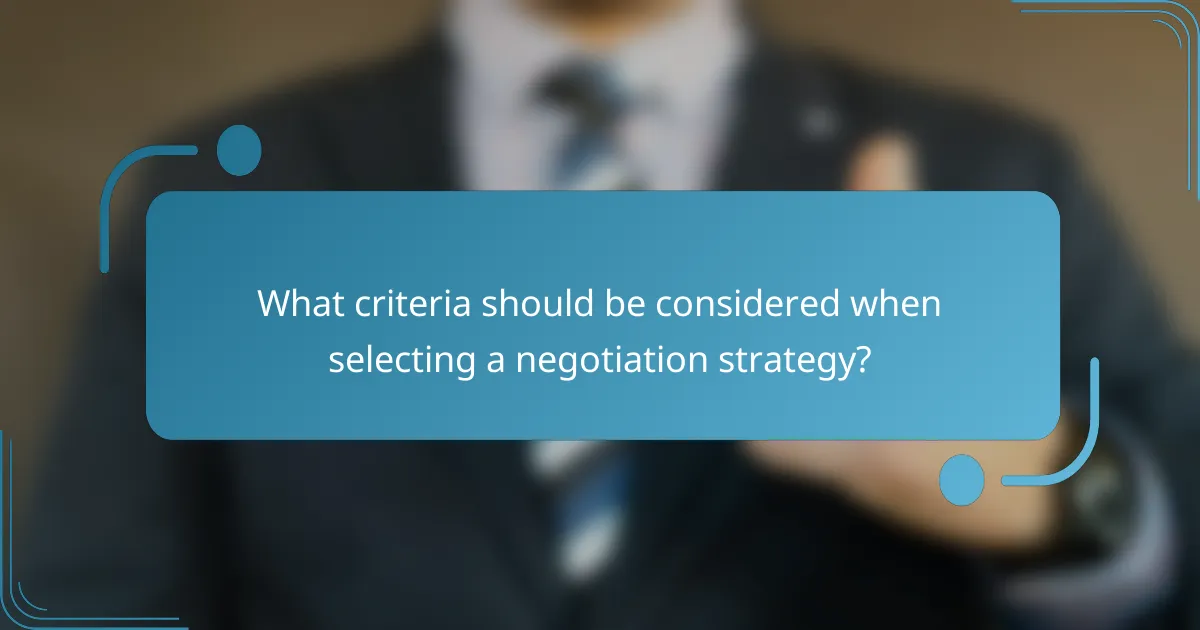
What criteria should be considered when selecting a negotiation strategy?
When selecting a negotiation strategy, consider factors such as the type of contract, the interests of stakeholders, and prevailing market conditions. These criteria help tailor your approach to achieve the best possible outcomes while minimizing risks.
Type of contract
The type of contract significantly influences the negotiation strategy. For instance, fixed-price contracts may require a more assertive approach to ensure favorable terms, while cost-plus contracts might benefit from a collaborative strategy to foster trust and transparency.
Understanding the contract type also helps in anticipating potential challenges. For example, service agreements often involve ongoing relationships, necessitating a focus on long-term benefits rather than short-term gains.
Stakeholder interests
Identifying the interests of all stakeholders is crucial for effective negotiation. Each party may have different goals, such as maximizing profit, ensuring quality, or maintaining a good relationship. A successful strategy aligns these interests to create win-win scenarios.
Engaging stakeholders early in the process can reveal underlying concerns and priorities. This understanding allows for tailored proposals that address specific needs, which can lead to smoother negotiations and better outcomes.
Market conditions
Market conditions play a vital role in shaping negotiation strategies. Factors such as supply and demand, economic trends, and competitive landscape can dictate the leverage each party holds. For example, in a buyer’s market, buyers may negotiate harder for lower prices.
Staying informed about market dynamics can provide insights into timing and strategy adjustments. For instance, if prices are rising, it may be wise to negotiate sooner rather than later to lock in better terms.






